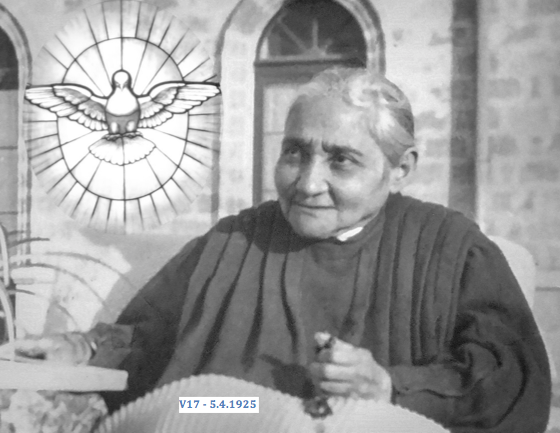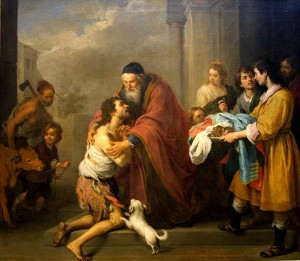Gospel from Luke 15:1-3, 11-32
(The Parable the two sons)
| Luke 15: 1 – 3, 11 – 32
|
|
| 1 | Now the tax collectors and sinners were all drawing near to hear him. |
| 2 | And the Pharisees and the scribes murmured, saying, “This man receives sinners and eats with them.” |
| 3 | So he told them this parable: |
| 11 | And he said, “There was a man who had two sons; |
| 12 | and the younger of them said to his father, `Father, give me the share of property that falls to me.’ And he divided his living between them. |
| 13 | Not many days later, the younger son gathered all he had and took his journey into a far country, and there he squandered his property in loose living. |
| 14 | And when he had spent everything, a great famine arose in that country, and he began to be in want. |
| 15 | So he went and joined himself to one of the citizens of that country, who sent him into his fields to feed swine. |
| 16 | And he would gladly have fed on the pods that the swine ate; and no one gave him anything. |
| 17 | But when he came to himself he said, `How many of my father’s hired servants have bread enough and to spare, but I perish here with hunger! |
| 18 | I will arise and go to my father, and I will say to him, “Father, I have sinned against heaven and before you; |
| 19 | I am no longer worthy to be called your son; treat me as one of your hired servants.”‘ |
| 20 | And he arose and came to his father. But while he was yet at a distance, his father saw him and had compassion, and ran and embraced him and kissed him. |
| 21 | And the son said to him, `Father, I have sinned against heaven and before you; I am no longer worthy to be called your son.’ |
| 22 | But the father said to his servants, `Bring quickly the best robe, and put it on him; and put a ring on his hand, and shoes on his feet; |
| 23 | and bring the fatted calf and kill it, and let us eat and make merry; |
| 24 | for this my son was dead, and is alive again; he was lost, and is found.’ And they began to make merry. |
| 25 | “Now his elder son was in the field; and as he came and drew near to the house, he heard music and dancing. |
| 26 | And he called one of the servants and asked what this meant. |
| 27 | And he said to him, `Your brother has come, and your father has killed the fatted calf, because he has received him safe and sound.’ |
| 28 | But he was angry and refused to go in. His father came out and entreated him, |
| 29 | but he answered his father, `Lo, these many years I have served you, and I never disobeyed your command; yet you never gave me a kid, that I might make merry with my friends. |
| 30 | But when this son of yours came, who has devoured your living with harlots, you killed for him the fatted calf!’ |
| 31 | And he said to him, `Son, you are always with me, and all that is mine is yours. |
| 32 | It was fitting to make merry and be glad, for this your brother was dead, and is alive; he was lost, and is found.'” |
We are all exiles on this earth and far away from our Heavenly home. The parable of the Prodigal Son has a deep symbolic meaning. When we ponder it, we spontaneously perceive that the Prodigal Son is non other than every person who through a sinful life has become estranged from God. For this reason, the parable is very real to us; it is the story of our lives. It is a symbol of our infidelity to God. But it is also the symbol of God’s unbounded mercy toward us. Today, as the world teems with prodigal sons and daughters, this parable is dramatized in countless millions. Every person is either that older son who is ever faithful to his father or that younger son who only through hard and painful experience becomes convinced that outside the father’s house there is no happiness.
The parable teaches us that God forgives and mercifully receives even the greatest sinners, if they repent and are sorry for their sins. The history of the human race is nothing but the history of God’s mercy. “The mercy of the Lord is from eternity to eternity upon them that fear Him.” (Psalm 103,17)
An awareness of one’s own misery induces sincere sorrow and repentance, as well as a desire to beg God for forgiveness and mercy. And where there is sorrow for sin and repentance, there one will find the ever generous mercy of God.
***
Taken from the Seventeenth Hour, from 9 to 10 AM, of the Hours of the Passion, when Jesus is once again before Pilate, who shows Him to the people:
My Jesus, forgive me if I too, a miserable sinful soul, want You dead! But, I pray You to make me die together with You.
In the meantime, O my tormented Jesus, moved by my sorrow, You seem to say to me, “My child, cling to My Heart, and take part in My pains and in My Reparations. This moment is solemn: either My death or the death of all creatures must be decided. In this moment, two currents pour into My Heart. In one there are all the souls who, if they want Me dead, it is because they want to find Life in Me; and so, by My acceptance of death for them, they are released from the eternal condemnation, and the doors of Heaven open to receive them. In the other current there are those who want Me dead out of hatred and as confirmation of their own condemnation; and My Heart is lacerated, and feels the death of each one of them, and the very pains of hell! Ah, My Heart cannot bear these bitter pains; I feel death at each heartbeat, at each breath, and I keep repeating, ‘Why will so much Blood be shed in vain? Why will My pains be useless for so many?’ Ah, child, sustain Me, for I can take no more. Take part in My pains; may your life be a continuous offering for the salvation of souls, so as to soothe pains so excruciating for Me!”

